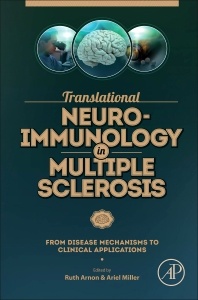Description
Translational Neuroimmunology in Multiple Sclerosis
From Disease Mechanisms to Clinical Applications
Language: English
Subjects for Translational Neuroimmunology in Multiple Sclerosis:
502 p. · 19x23.3 cm · Hardback
Description
/li>Contents
/li>Readership
/li>Biography
/li>Comment
/li>
Multiple sclerosis (MS) is the most common disabling neurological disease of young adults. More than 2.3 million people are affected by MS worldwide. Symptoms can vary widely, depending on the localization and amount of the damage induced by combined inflammatory, demyelinating, and neurodegenerative processes. Although a cure for MS does not currently exist, therapies can help treat MS attacks, attenuate disease activity, reduce progress of the disease, and manage symptoms.
Translational Neuroimmunology in Multiple Sclerosis provides an overview of recent findings and knowledge of the neuroimmunology of multiple sclerosis, from experimental models and the human disease to the translation of this research to immunotherapeutic strategies. Chapters describe genetic and environmental factors underlying the disease pathogenesis of MS as a basis for development of immunotherapies, immunological markers of disease activity, pharmacogenetics, and responses to therapy. Immunomodulatory therapies currently in practice and future therapeutic strategies on the horizon?such as neuroprotective strategies, stem cells, and repair promotion?are discussed. Contributed by renowned leaders in the field, this cross-disciplinary volume is a great resource for basic scientists and clinical practitioners in neuroscience, neurology, immunology, pharmacology, and in-drug development.
Section I: MS Pathology and Mechanisms 1. MS Pathology: Inflammation versus Neurodegeneration 2. Immune Dysregulation in Multiple Sclerosis 3. CNS immune regulation 4. Genetics of Multiple Sclerosis 5. MS Subtypes: How the Natural History of MS was Challenged Due to Treatment 6. Pediatric-Onset MS as a Window into Early Disease Targets and Mechanisms 7. Sex-related factors in multiple sclerosis
Section II: Other Patho-Mechanisms 8. Environmental Factors and their regulation of immunity in MS 9. Gut Microbiota in Multiple Sclerosis: A Bioreactor driving Brain Autoimmunity 10. Neuroendocrine Checkpoints of Innate Immune Responses in Multiple Sclerosis: Reciprocal Interactions Between Body and Brain 11. Fighting chronic neuroinflammation by boosting autoimmunity: the distinction between neurodegenerative diseases and multiple sclerosis 12. Neuroactive steroids and Neuroinflammation
Section III: Surrogate Markers in Multiple Sclerosis 13. Surrogate Markers in Multiple Sclerosis: The Role of MRI
Section IV: Currently Approved Therapies – Injectable 14. Interferon ß in Multiple Sclerosis: A Review 15. Glatiramer Acetate - From Bench to Bed and Back 16. Natalizumab 17. Alemtuzumab (Campath-1H) 18. Currently approved DMDs-injectable: cytotoxic immunosuppressive drugs
Section V: Currently Approved DMDs – Oral 19. Fingolimod (Gilenya) 20. Oral Dimethyl Fumarate (BG-12; Tecfidera®) for Multiple Sclerosis 21. Emerging Therapies for Multiple Sclerosis
Section VI: Symptomatic and Complementary Treatments 22. Treatment of acute relapses in Multiple sclerosis 23. Shedding light on Vitamin D and MS 24. Symptomatic and Complementary Treatments 25. Cognitive Impairment in Multiple Sclerosis
Section VII: Novel and Emerging Strategies 26. Personalized Medicine and Theranostics: Applications to Multiple Sclerosis 27. Stem cell based-therapies, remyelination and repair promotion, in the treatment of multiple sclerosis 28. Stem cells in Multiple Sclerosis 29. T cell vaccination: An insight into T cell regulation 30. Reversal of Misfortune: Therapeutic Strategies on the Horizon
Basic and clinical scientists and practitioners in neuroscience, neurology, immunology, and pharmacology
- Provides an overview of recent findings and knowledge of the neuroimmunology of multiple sclerosis and the translation of this research to immunotherapy treatment
- Edited by renowned leaders in the field of neuroimmunology and multiple sclerosis
- Contains the latest resource material for basic and clinical scientists and practitioners in neuroscience, neurology, immunology, and pharmacology
- 2017 BMA Medical Book Awards Highly Commended in Neurology
These books may interest you

Primer on Multiple Sclerosis 146.26 €



